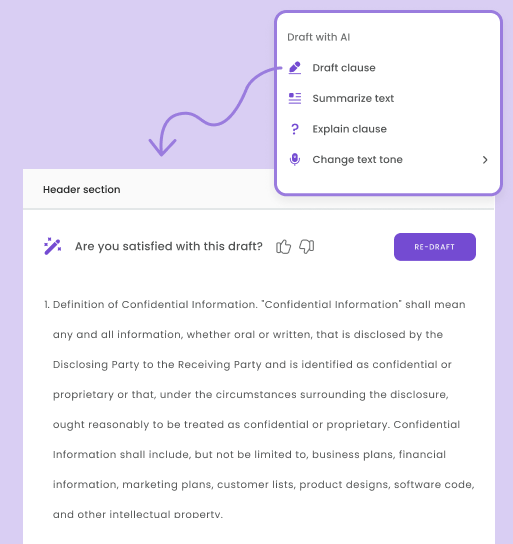Often, it feels like getting a contract signed is the finish line. All the meetings, proposals, contract negotiations, and error-checking have finally paid off.
Unfortunately, a signed contract is just a milestone on the journey, and contract rescission can legally occur if you’re not careful.
In this guide, you’ll learn what contract rescission is, the reasons or justifications for contract rescission, and the methods that can be used to rescind a contract.
Understanding Contract Rescission
Contract rescission refers to the legal process through which a contract is canceled or terminated. You essentially restore all parties involved to their pre-contractual positions.
The legal basis for contract rescission typically stems from various circumstances that render the contract either voidable or unjust, such as mutual mistake, fraud, duress, or unconscionability. Rescission is often sought as a remedy to rectify the defects in the formation or execution of a contract.
Types of contracts eligible for rescission:
- Voidable contracts: Voidable contracts are agreements with a flaw or defect that allows one of the parties to choose whether to enforce or void the contract. This may arise from factors such as misrepresentation, undue influence, or lack of capacity. One of the major elements that make a contract valid is missing. Rescission of voidable contracts provides a legal means to set aside the agreement if the affected party decides to do so.
- Contracts with mutual mistake or fraud: Rescission may be warranted if the parties were not in agreement about a fundamental aspect of the contract, or if one party deliberately deceived the other. The injured party may seek rescission to undo the contract.
- Unconscionable contracts: Contracts deemed unconscionable, where the terms are excessively unfair or oppressive, may be subject to rescission. This happens when one party takes advantage of another party due to age, lack of experience, poor financial situation, etc. Predatory loans have often been shown to fall under this category. When brought to light, the contract may be deemed fundamentally unfair by the court.
Legal consequences of contract rescission:
- Restoration of parties to pre-contract status: One of the primary consequences of rescission is the restoration of the parties to their pre-contractual positions. This involves undoing the legal effects of the contract as if it never existed. The parties are returned to the state they were in before agreeing. This can vary widely based on the contract and the possibility of restoration. For example, if a priceless heirloom was destroyed, it may be impossible to make one party whole. Other remedies may be sought.
- Discharge of contractual obligations: Upon rescission, the contractual obligations that were initially binding on the parties are discharged. This relieves both parties from the duties and responsibilities outlined in the contract, acknowledging the invalidity of the agreement.
- Potential restitution or compensation: In some cases, rescission may involve the return of consideration or compensation received under the contract. This aims to achieve fairness by ensuring that both parties are restored to their original positions. However, the specifics of restitution may vary based on the circumstances of the case and the applicable legal principles.
Contract rescission serves as a legal remedy to address defects in contracts, providing a means to undo agreements that are deemed voidable, fraudulent, or unconscionable. The process is designed to restore parties to their pre-contractual positions, discharge obligations, and, in certain cases, facilitate restitution or compensation.
Grounds for Contract Rescission
There are many reasons a contract may need to be rescinded. Some of them are honest mistakes while others may have malicious intentions. In every case, it’s up to the people involved in the contract to take action and initiate the process. No one will void a contract for you so it’s important, even after a contract has been signed, to review it regularly.
Mutual mistake or misrepresentation:
- Misrepresentation of material facts: Contract rescission may be justified when one party has made a false statement or misrepresentation of material facts that induced the other party to enter into the contract. Material facts are those that would likely influence a reasonable person’s decision-making process. If a party relies on such misrepresentations and suffers harm as a result, they may seek rescission. For example, if a vendor tells you they have an experienced team of engineers, expert electricians, architects, etc., then you may enter an agreement for them to build your house. If you later find out that they’re using apprentices and university students, that’s a material misrepresentation of facts that would reasonably impact your decision to work with them.
- Fraudulent inducement: Fraudulent inducement occurs when a party intentionally provides false information to deceive the other party into entering a contract. If a contract is formed based on fraudulent inducement, the deceived party has grounds for rescission. Courts may grant rescission to rectify the injustice caused by the intentional deception.
Lack of capacity or legal competency:
Contracts may be rescinded if one of the parties lacks the legal capacity or competency to enter into an agreement. This lack of capacity could be due to factors such as mental incapacity, intoxication, or the party being a minor. Rescission in such cases recognizes the vulnerability of certain individuals and aims to protect them from potentially unfair contractual obligations.
Duress or undue influence:
Contractual agreements entered into under duress or undue influence can be voidable, providing grounds for rescission. Duress involves coercion or threats that force someone into entering a contract against their will.
Undue influence occurs when someone takes advantage of a position of power or trust to manipulate the decision-making of the other party. This is more common in elder abuse scenarios when a ‘trusted’ relative or caretaker coerces the senior relative to enter into a detrimental agreement.
Rescission in these cases aims to restore fairness and protect parties from agreements made under improper pressure.
Unconscionability of the contract terms:
Rescission may be warranted when the terms of a contract are deemed unconscionable. Unconscionability refers to contract terms that are so one-sided, oppressive, or unfair that enforcing them would be contrary to good conscience.
Courts may intervene and allow rescission to prevent the enforcement of unconscionable terms and protect the party subjected to unfairness. The problem with this type of rescission is that it’s often hard to meet the requirements of being unconscionable and it’s subjective. If two judges see the same contract, one may believe it’s unconscionable and the other may feel it’s still within reason.
Illegality or violation of public policy:
Contracts that involve illegal activities or violate public policy may be subject to rescission. If the purpose or performance of a contract goes against established laws or public policy principles, the court may declare the contract void and permit rescission. This reflects the legal system’s commitment to upholding lawful and ethical standards in contractual relationships.
Grounds for contract rescission include situations involving mutual mistake or misrepresentation, lack of capacity, duress or undue influence, unconscionability of contract terms, and illegality or violation of public policy. Rescission provides a legal remedy to address these issues, aiming to restore fairness and protect the parties involved in the contractual relationship.
How to Rescind a Contract
Identifying grounds for rescission:
The first step in rescinding a contract is identifying valid grounds for rescission. This may include mutual mistake, misrepresentation, lack of capacity, duress, unconscionability, or illegality. The party seeking rescission should carefully assess the circumstances surrounding the contract and determine if any of these grounds apply.
Providing notice to the other party:
Once grounds for rescission are identified, the next step is to provide notice to the other party. The notice should clearly state the reasons for seeking rescission and may include references to specific contractual provisions or legal principles supporting the request. Providing prompt and clear notice is crucial for initiating the rescission process.
Negotiating the terms of rescission:
- Restitution and compensation: Parties involved in the rescission process may negotiate terms related to restitution and compensation. This involves discussing the return of any benefits or consideration received under the contract and compensating the affected party for any losses incurred.
- Return of consideration: Negotiating the return of consideration involves determining how any money, property, or other valuable items exchanged as part of the contract will be returned. Parties may agree on a specific method or timeline for the return of consideration.
- Release of liabilities: Parties may negotiate the release of liabilities associated with the rescinded contract. This includes clarifying that neither party will hold the other liable for any further obligations arising from the original agreement.
Documenting the rescission agreement:
Once negotiations are complete, the rescission agreement should be documented in writing. The agreement should clearly outline the terms agreed upon by both parties, including details regarding restitution, compensation, and the release of liabilities. Having a written agreement helps avoid misunderstandings and provides a legal record of the rescission process.
Legal formalities and considerations:
- Involvement of legal counsel: Legal counsel can help assess the validity of grounds for rescission, guide negotiations, and ensure that the rescission process is conducted per applicable laws. Having legal representation can also help protect the interests of the party seeking rescission.
- Compliance with applicable laws and regulations: Parties should be aware of legal requirements specific to their jurisdiction and industry. Failing to comply with legal formalities may undermine the validity of the rescission and lead to further legal complications.
The process of rescinding a contract involves identifying grounds for rescission, providing notice to the other party, negotiating the terms of rescission, documenting the agreement, and ensuring compliance with legal formalities. Seeking legal counsel is advisable to navigate the complexities of the rescission process and protect the interests of the parties involved.
Conclusion
In an ideal world, contracts will be executed without issues. Unfortunately, there are times when a contract needs to be rescinded.
This guide has looked at what contract rescission is, the different grounds for legal contract rescission, and how to rescind a contract the right way.
If you’re looking for ways to create high-quality contracts and reduce the instances of grounds for rescission, be sure to check out DoxFlowy – our document automation solution.




